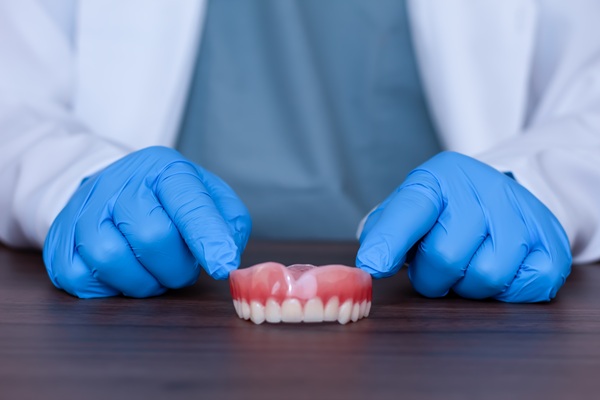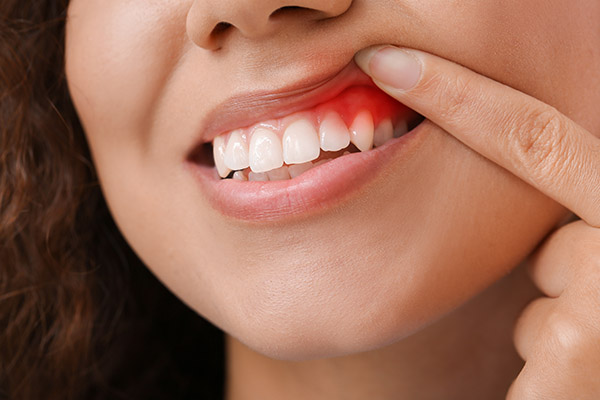Proper Denture Care: Tips for a Comfortable, Long-Lasting Fit

Dentures provide a functional and aesthetic solution for people missing multiple teeth. However, proper denture care is essential to ensuring comfort, durability, and oral health. People with new dentures must establish a consistent cleaning routine and learn how to handle them carefully. Without proper maintenance, dentures can become uncomfortable, harbor harmful bacteria, or wear out prematurely. The following tips can help you care for your dentures and lead to better long-term outcomes.
The basics of denture care
Daily cleaning routine
A consistent denture care routine keeps appliances clean and maintains their longevity. Using a soft-bristled toothbrush and a denture-specific cleaner helps remove food particles, plaque, and bacteria without scratching the material. Avoid abrasive toothpaste and stiff brushes, as they can damage the surface. Soaking dentures in a specialized cleaning solution overnight prevents drying and helps remove stains, but patients with metal components should consult a dental team for suitable products. In the morning, thoroughly rinsing dentures ensures no cleaning residue remains before wearing them.
Oral hygiene practices with dentures
Even with full dentures, patients must continue practicing good oral hygiene for their gum and oral health. With a soft-bristled brush, brush the gums, tongue, and roof of the mouth to stimulate circulation and remove bacteria. Additionally, rinsing with an antimicrobial mouthwash can reduce the risk of infections.
For those with partial dentures, brushing natural teeth twice a day with fluoride toothpaste can prevent decay and gum disease. Flossing and using an interdental brush help clean areas where food particles may accumulate. Regular dental visits also help ensure the patient's natural teeth and dentures remain healthy.
Denture handling and storage
Dentures are delicate and can break if the patient drops them when they are not in use. Handling them over a soft towel or a sink filled with water provides a cushion if the patient accidentally drops them. When not in use, storing dentures in a container with a mild soaking solution or water can help prevent them from drying out and losing their shape. Be sure not to expose the dentures to hot water, as high temperatures can warp the material.
Maintaining a secure fit
Over time, the patient's gum tissue and bone structure may change, affecting how their dentures fit. An ill-fitting set of dentures may cause discomfort, irritation, or difficulty speaking and eating. Scheduling regular dental visits allows a dental provider to assess fit and make necessary adjustments. If dentures feel loose or cause sore spots and irritation, professional evaluation can prevent further complications.
Denture adhesives may provide temporary stability. However, they should not replace professional adjustments. Using a dentist-recommended adhesive in moderation can improve retention while ensuring easy removal when cleaning them. If dentures no longer fit properly, the patient may need a reline or replacement.
Call us for more denture care tips
Following proper denture care guidelines ensures your new teeth are comfortable and durable. Would you like to learn more about how to care for your dentures? Call our Brooklyn office for more helpful tips and tricks.
Request an appointment here: https://www.myddsny.com or call Inna Goykman-Amir DDS at (718) 416-6364 for an appointment in our Brooklyn office.
Check out what others are saying about our dental services on Yelp: Denture Care in Brooklyn, NY.
Related Posts
You need to have a checkup at a dental practice every six months. This is when a hygienist cleans your teeth to remove any buildup of plaque and tartar. This is also the time when a dentist does an oral examination, looking for things like cavities, gum disease, and even oral cancer. However, during regular…
TMJ treatment can ease jaw pain, clicking, and stiffness. The jaw joints and the muscles around them work hard every day to support speaking, chewing, and yawning. When these joints become unbalanced, patients may notice soreness, popping sounds, headaches, or even a feeling that the jaw locks or shifts. A dentist evaluates these symptoms, looks…
While most people visit a dental practice every six months, others only go on occasion or not at all. For those individuals, the thought of seeing a dentist causes a lot of anxiety. Hopefully, the information provided about how a dentist treats a cavity will answer questions and put them at ease. These people will…
During a dental practice visit, dentists assess the patient and then treat the issues scheduled for that day. It is a dentist’s responsibility to provide safe and extensive dental treatments. The patient goes home with a cleaner, healthier mouth and a better perspective about dental health. Each dental practice has its own set of steps…


